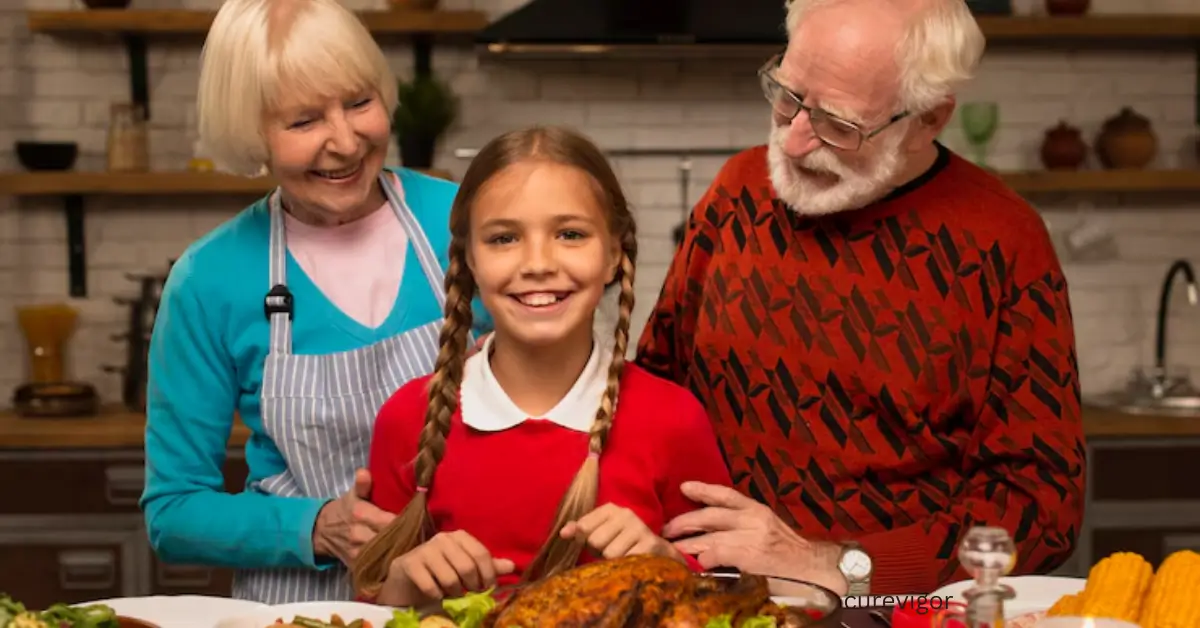Feeling overwhelmed as a parent? Discover the powerful, science-backed role grandparents play. Learn how their support reduces stress, boosts child development, and creates a happier, healthier family unit.
Thank you for reading this post, don't forget to subscribe!How Grandparents Make Parenting Easier
Parenting is one of life’s most rewarding journeys, but let’s be honest—it’s also exhausting. In the hustle of modern life, where parents often juggle careers, household management, and raising children, the phrase “it takes a village” has never felt more relevant.
Yet, many of us have lost touch with that village. What if your most valuable ally was already part of the family?
Grandparents are far more than just occasional babysitters or holiday visitors; they offer a built-in support system grounded in wisdom, patience, and unconditional love. This article explores how strengthening this relationship can reduce parental stress and enrich your child’s life.
The Village You’ve Been Missing: Grandparents as a Core Support System.

The nuclear family model can be isolating. Grandparents reintroduce the multi-generational dynamic that humans have thrived in for centuries, providing tangible and intangible layers of support that directly ease parental burdens.
Practical, Hands-On Help: The Ultimate Stress-Reducer.
This is the most immediate and obvious benefit. Grandparents provide reliable, trusted, and often free childcare, which is a significant financial and emotional relief.
Respite Care and Parental Sanity: They enable parents to have date nights, pursue hobbies, or simply enjoy uninterrupted quiet time. This isn’t a luxury; it’s essential for preventing burnout and maintaining a strong parental relationship.
Logistical Lifesavers: From school pickups and sick-day coverage to ferrying kids to sports practice or music lessons, grandparents are invaluable in managing the complex logistics of modern family life.
Household Support: Many grandparents help with meal preparation, laundry, or light housekeeping during visits, lifting everyday tasks off the parents’ plates.
Emotional Support and a Confidant for Everyone.
A grandparent’s home is often a designated “safe harbor” for children and parents.
For Children: Grandparents offer unconditional love free from the daily pressures of discipline and homework. Children often confide in them about school stress or social anxieties they might hesitate to share with parents.
For Parents: Grandparents serve as a sounding board. They offer seasoned, non-judgmental advice from a place of experience, reminding frazzled parents that “this too shall pass.”
Beyond Babysitting: The Science-Backed Benefits for Child Development

Research in child psychology and sociology consistently highlights the unique advantages of a strong grandparent-grandchild bond.
Boosting Emotional Intelligence and Resilience
Studies have shown that children with involved grandparents have higher levels of emotional intelligence and prosocial behavior (like showing empathy and compassion).
A Secure Base: The unwavering love and acceptance from a grandparent provide a deep sense of security, which is the foundation for children to explore the world and take healthy risks.
Navigating Conflict: By observing how their grandparents resolve disagreements or offer perspective, children learn valuable conflict-resolution skills.
Enhancing Cultural and Familial Identity.
Grandparents are the archivists of the family.
Storytellers and Historians: They share family narratives, stories about parents as children, and keep the memory of ancestors alive. This gives children a powerful sense of their place in a larger story.
Transmitting Heritage: They are the primary conduits for passing down cultural traditions, religious customs, native languages, and even beloved family recipes. This connection to the past is crucial for forming a strong identity.
The Gift of Time and Perspective: Lessons That Shape Character
Grandparents operate on a different timetable. Unburdened by the daily rush, they impart patience and wisdom in a way busy parents often can’t.
Teachers of Practical Wisdom and Life Skills.
With patience born of experience, grandparents teach timeless, hands-on lessons.
Lost Arts: Activities like gardening, woodworking, knitting, or baking from scratch teach patience, precision, and the profound satisfaction of creating something tangible.
Historical Context: They provide a living link to history, helping children understand events like the Cold War or the dawn of the internet not as abstract concepts, but through personal stories.
Modeling Values and Strengthening Morals
Grandparents often reinforce the values parents are trying to instill—kindness, respect, perseverance—but from a different, powerful angle. Their stories often come with real-life examples of these values in action, making them more relatable and impactful.
Making It Work: Navigating the Modern Grandparent Relationship
For this support system to thrive, it requires intention, communication, and mutual respect from both generations.
Setting Clear and Healthy Boundaries
The goal is harmony, not conflict.
Open Dialogue: Have respectful conversations about parenting styles, core rules (e.g., nutrition, discipline, screen time), and expectations. Frame it as, “We want you to enjoy your time with the kids, and here’s how you can help us stay consistent.”
Respect Roles: Grandparents should strive to support the parents’ rules, while parents should avoid micromanaging and allow the grandparent-grandchild relationship to be unique and special.
The Long-Distance Grandparent: Staying Connected Across Miles
Physical distance doesn’t have to mean emotional distance.
Leverage Technology: Schedule regular video calls for virtual bedtime stories, show-and-tell sessions, or online game nights. Create a shared family photo album digitally that everyone can contribute to.
Quality over Quantity: Make visits special and intentional. When together, focus on creating rituals and memories rather than running errands.
Snail Mail: Encourage grandparents to send letters, postcards, or small packages. The tactile excitement of receiving mail is a thrill for a child and keeps the connection alive between visits.
The Ripple Effect: How Grandparents Strengthen the Entire Family
The benefits of this relationship radiate outward, creating a healthier and happier family ecosystem for everyone.
For Parents: Reduced stress, more free time, and the comfort of knowing their children are surrounded by extra love and guidance.
For Grandparents: A sense of purpose, vitality, and staying mentally and socially engaged. Studies suggest involved grandparents may even enjoy longer, healthier lives.
For Children: The undeniable advantage of growing up with more adults who love them, guide them, and champion their success.
In raising children, grandparents are not a peripheral bonus; they are a central pillar of a strong family foundation. They offer practical help, enrich a child’s development, and support the entire family’s well-being.
By intentionally nurturing these bonds—through communication, mutual respect, and gratitude—we do more than make parenting easier. We give our children the gift of security, love, and identity that comes from being cherished by multiple generations. Embrace your village. It’s already right there.
FAQs
Q: My parents have a very different parenting style. How can we get on the same page?
Focus on alignment on the “big things” (major safety rules, health guidelines) and grace on the “small things” (an extra cookie, a slightly later bedtime). Communicate your non-negotiable rules clearly and calmly, explaining the why behind them. Most grandparents ultimately want to support you, even if it takes a gentle reminder.
Q: Are there benefits for the grandparents themselves?
Absolutely. Research has shown that involved grandparents often report higher life satisfaction, a stronger sense of purpose, and increased social and cognitive activity. This meaningful engagement can contribute to better mental and physical health in their later years.
Q: How can I help my long-distance grandparents feel more involved?
Get creative with technology! Have them read a bedtime story via video call. Let them be a special audience for a school practice presentation. Send them quick video clips of your child’s day. Ask for their advice or stories about family history to make them feel valued as a resource.
Q: What if my child’s grandparents are no longer with us?
The role of a wise, supportive elder can be filled by other important figures in a child’s life—a loving aunt or uncle, a family friend, or a trusted mentor. The key is to foster those deep, trusting relationships with adults from an older generation who can offer perspective and unconditional love.
Q: How much influence should grandparents have on parenting decisions?
The final decision on parenting choices always rests with the parents. However, grandparents can be invaluable advisors. It’s wise to listen to their experience and perspective, but ultimately, you must make the choices you feel are best for your child. A good rule of thumb: grandparents offer advice when asked, and parents receive it with gratitude, making their own decisions.
Read more articles on Health and Wellness Tips.
You might like to read:

